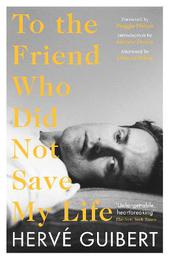
|
To the Friend Who Did Not Save My Life
Paperback / softback
Main Details
| Title |
To the Friend Who Did Not Save My Life
|
| Authors and Contributors |
By (author) Herve Guibert
|
|
Foreword by Maggie Nelson
|
|
Contributions by Edmund White
|
|
Translated by Linda Coverdale
|
| Physical Properties |
| Format:Paperback / softback | | Pages:288 | | Dimensions(mm): Height 196,Width 128 |
|
| Category/Genre | Modern and contemporary fiction (post c 1945) |
|---|
| ISBN/Barcode |
9781788168397
|
| Classifications | Dewey:843.92 |
|---|
| Audience | |
|---|
| Edition |
Main - Classic Edition
|
|
Publishing Details |
| Publisher |
Profile Books Ltd
|
| Imprint |
Serpent's Tail
|
| Publication Date |
5 August 2021 |
| Publication Country |
United Kingdom
|
Description
A New York Times Book of the Year After being diagnosed with AIDS, Herve Guibert wrote this devastating, darkly humorous and personal novel, chronicling three months in the penultimate year of the narrator's life. In the wake of his friend Muzil's death, he goes from one quack doctor to another, from holidays to test centres, and charts the highs and lows of trying to cheat death. On publication in 1990, the novel scandalized French media, which quickly identified Muzil as Guibert's close friend Michel Foucault. The book became a bestseller, and Guibert a celebrity. The book has since attained a cult following for its tender, fragmented and beautifully written accounts of illness, friendship, sex, art and everyday life. It catapulted Guibert into notoriety and sealed his reputation as a writer of shocking precision and power.
Author Biography
Herve Guibert (1955-1991) was a writer, photographer and filmmaker. Among his many pieces of writing, To the Friend caused a scandal and quickly became his most famous work. He finished three more books, including The Compassion Protocol, and a film, La Pudeur ou L'impudeur, before he died aged 36, only one year after the publication of To the Friend.
Reviews[Full of] innovation and historical importance, ... breathtaking indiscretion, tenderness and gore. -- Parul Sehgal * New York Times * The father of autofiction, the master of finding that perfect balance of truth and beauty. * Guardian * As much about friendship, intimacy, and betrayal as it is about sickness. ... Brilliant * Dazed * Written with urgency, clarity, controlled rage. ... it is electrifying in its searing honesty -- Colm Toibin A writer of courage, beguiling flair * New Yorker * Relentlessly honest, extraordinarily truthful * Kirkus Reviews * This moving French bestseller ... reads like a personal memoir. Delivered with wit, verve and valor * Publishers Weekly * 'Dark and unsettling, yet Guibert manages to find beauty and tenderness in the world around him.' -- Moyra Davey, author of Index Cards The book is a lightly fictionalized (and magnificently indiscreet) account of the final days of the philosopher Michel Foucault, Guibert's neighbor and friend. Guibert possesses an aloof, silvery style - a cool envelope for scalding material: a homage to a friendship and its betrayal, and a document of the breakdown of his own body. It is an unforgettable, heartbreaking evocation of the early days of the epidemic, when gay men were forced to become their own scientists, lobbyists, archivists. -- Parul Sehgal * New York Times * Outstandingly colloquial and exact translation ... urgent and monitory. ... Restrained and controlled...but full of well-noticed contrasting details that combine to create an effect that Guibert...characterized as "barbarous and delicate." -- Marco Roth * Book Forum * 'Reveals a writer of courage, beguiling flair, and sometimes maddening nastiness ... The rare book that truly deserves the epithet "unflinching." Its author may be afraid to die, but on the page his voice doesn't crack, his hand doesn't tremble. ... In Linda Coverdale's masterly translation ...[the book] powerfully evokes the aids epidemic's uncertain early days. * New Yorker * [Guibert's] work has been strangely neglected in the Anglophone world, never mind its innovation and historical importance, its breathtaking indiscretion, tenderness and gore. How can an artist so original, so thrillingly indifferent to convention and the tyranny of good taste - let alone one so prescient - remain untranslated and unread? -- Parul Sehgal * New York Times * One of the most beautiful, haunting, and fascinating works in the French autofictional canon. Guibert grapples with his own AIDS diagnosis, and the death of his friend Muzil, in a dazzling piece of writing. It's a book that gives me goose-bumps every time I open it - I'm thrilled that it's being reissued in the UK, where Guibert's extraordinary writing deserves to be much better known. -- Katherine Angel Thirty years on, it can be hard to adequately describe what things felt like when AIDS first swung its wrecking ball. But that's exactly what Guibert achieves. He writes from the inside, and deploys every trick of his famously disinhibited prose to make sure that the squalor and madness of his journey through HIV infection hit us right between the eyes . His testimony is as brutal as it is elegant; shot through with a scalding and necessary rage. -- Neil Bartlett, author * Ready to Catch Him Should He Fall *
|